最新高中英语人教新课标必修1 Unit3精品教学设计Travel journal--period2 教案
新课标高一必修1 英语教案Unit 3 Travel Journal (全套教案)
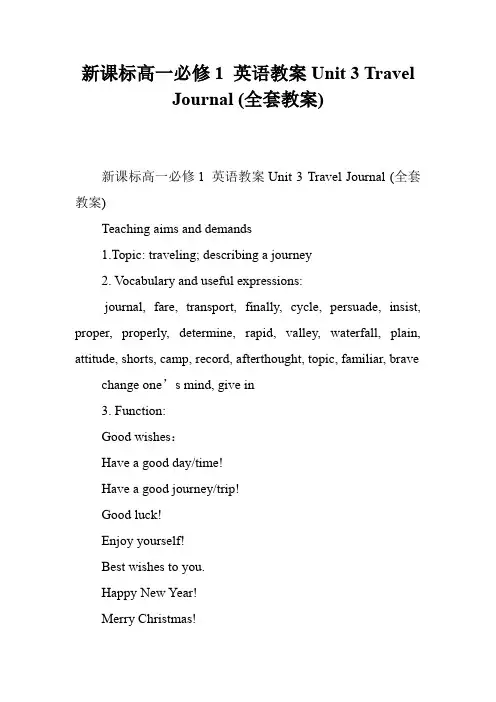
新课标高一必修1 英语教案Unit 3 TravelJournal (全套教案)新课标高一必修1 英语教案Unit 3 Travel Journal (全套教案)Teaching aims and demands1.Topic: traveling; describing a journey2. V ocabulary and useful expressions:journal, fare, transport, finally, cycle, persuade, insist, proper, properly, determine, rapid, valley, waterfall, plain, attitude, shorts, camp, record, afterthought, topic, familiar, brave change one’s mind, give in3. Function:Good wishes:Have a good day/time!Have a good journey/trip!Good luck!Enjoy yourself!Best wishes to you.Happy New Year!Merry Christmas!Happy birthday!Thank you.You, too.The same to you.Means of transportation:walking, cycling, horse riding, taking buses/trains/boats/planes4. Grammar: 现在进行表将来Where are you going on holiday?I am going to Hawaii on holiday.When are we coming back?Teaching procedure:Period 1.Step 1.Warming up1. Ask some questions:Do you often travel? Where have you been?2. Following the steps of the warm-up on page 17.Step 2. Pre-reading1. Show some traveling pictures of the teacher’s.2. Ask Ss : which river is the longest one in the world and which is the largest one; which river is the longest one in China.3. Ask Ss: how people who live along a river use it.Step 3. While-reading1. Scanning: Ss read quickly and answer:What are they going to do?2. Skimming: Ss read again and finish comprehending 1 on page 19.3. Ss read and get the main ideas of each paragraph.4. Ss list the countries that the Mekong River flows through.Step 4. After-readingSs in pairs and discuss: Wang Wei’s and Wang Kun’s similar and different attitudes about the trip.Similar attitudes about the trip Different attitudes about the tripBoth Wang Wei and Wang Kun think…1. taking this trip is a dream come true.2. that they will enjoy this trip a lot.3. they should see a lot of the Mekong.4. that most of the Mekong will be found in Southeast Asia. Wang Wei believes…1. they must start in Qinghai where the river begins /see all of the Mekong.2. that they don’t need to prepare muchWang Kun believes…1. it is too cold and high to start in Qinghai.2. that using an atlas is very important.Step 5. Assignment1. surf the internet and get more information about the Mekong River.2. retell the passage use your own words.Period 2.Step 1. Warming upAsk some Ss to retell the passage that they have learnt last period.Step 2. Learning about the languageTeacher explain some language points in the text on page 18.1. persuade sb. into /out of sth.: cause sb (not) to do sth by arguing or reasoning with him 说服或劝说某人(不)做某事He is easily persuaded.Wang Kun couldn’t persuade his sister to change her mind.persuade sb (that clause): cause sb to believe sth; convince sb. 使某人信服How can I persuade you that I am telling the truth?2. insist(v. ): demand (sth) forcefully, not accepting a refusal 坚持或坚决要求;Since he insisted, I had to stay.insist on sth/doing sth: require or demand ; refuse to accept an alternative 一定要(某事物),坚决主张She insists on getting up early and playing her radio loud.3. care about: be worried, concerned or interested 忧虑,关心,惦念don’t you care about anybody?I don’t care about what happens to him.care for /to do: be willing or agree to do sth.; wish or like to do sth.Would you care a drink?Would you care to go for a walk?care for sb.1). Like or love sb.He cares for her deeply.2). Look after sb; take care of sb; be responsible for sbWho will care for your child if you are out?4. Once she has made up her mind, nothing can change it. 她一旦下了决心,什么也不能使她改变。
最新高中英语人教新课标必修1 Unit3精品教学设计Travel journal--period1 教案
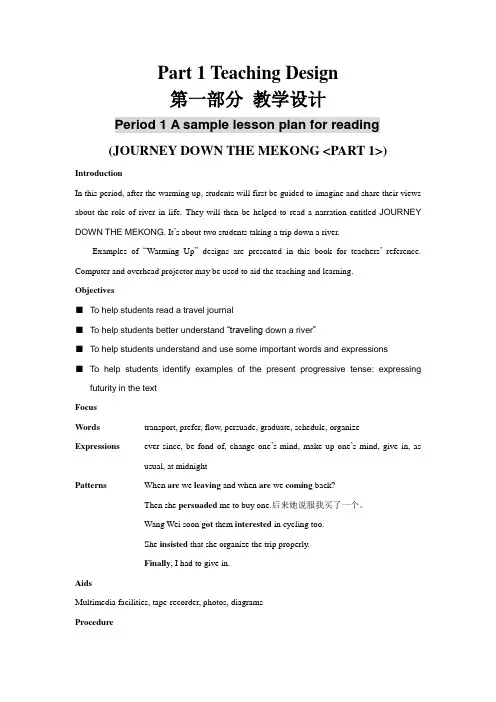
Part 1 Teaching Design第一部分教学设计Period 1 A sample lesson plan for reading(JOURNEY DOWN THE MEKONG <PART 1>) IntroductionIn this period, after the warming up, students will first be guided to imagine and share their views about the role of river in life. They will then be helped to read a narration entitled JOURNEY DOWN THE MEKONG. It’s about two students taking a trip down a river.Examples of “Warming Up”designs are presented in this book for teachers’reference. Computer and overhead projector may be used to aid the teaching and learning.Objectives■To help students read a travel journal■To help students better understand “traveling down a river”■To help students understand and use some important words and expressions■To help students identify examples of the present progressive tense: expressing futurity in the textFocusWords transport, prefer, flow, persuade, graduate, schedule, organizeExpressions ever since, be fond of, change one’s mind, make up one’s mind, give in, as usual, at midnightPatterns When are we leaving and when are we coming back?Then she persuaded me to buy one.后来她说服我买了一个。
人教版新课标英语必修一Unit3 Travel Journal reading 课程教学设计
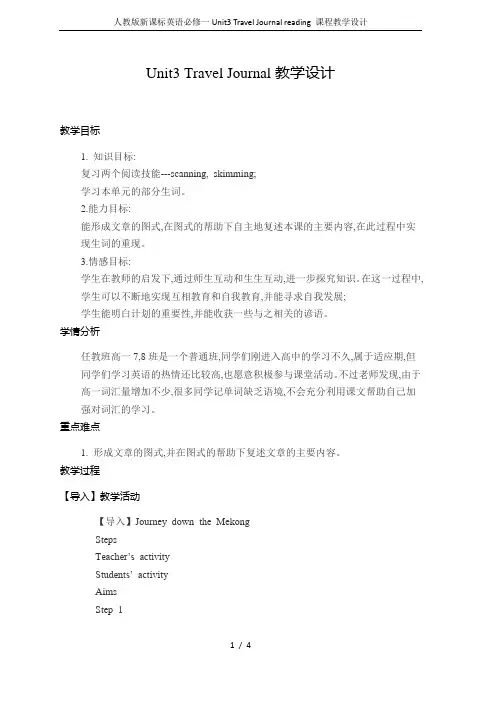
Unit3 Travel Journal教学设计教学目标1. 知识目标:复习两个阅读技能---scanning, skimming;学习本单元的部分生词。
2.能力目标:能形成文章的图式,在图式的帮助下自主地复述本课的主要内容,在此过程中实现生词的重现。
3.情感目标:学生在教师的启发下,通过师生互动和生生互动,进一步探究知识。
在这一过程中,学生可以不断地实现互相教育和自我教育,并能寻求自我发展;学生能明白计划的重要性,并能收获一些与之相关的谚语。
学情分析任教班高一7,8班是一个普通班,同学们刚进入高中的学习不久,属于适应期,但同学们学习英语的热情还比较高,也愿意积极参与课堂活动。
不过老师发现,由于高一词汇量增加不少,很多同学记单词缺乏语境,不会充分利用课文帮助自己加强对词汇的学习。
重点难点1. 形成文章的图式,并在图式的帮助下复述文章的主要内容。
教学过程【导入】教学活动【导入】Journey down the MekongStepsTeacher’s activityStudents’ activityAimsStep 1Show and tell the students the learning goals for them and make possible explanationsStudents listen to the teacher and have an idea of what they are going to learn in this class.To make the students know what they are to learn in this classStep 21). Show some pictures with beautiful scenery2) Ask the students two questions:Are they attractive?Where do you want to travel? –I dream about traveling…1.) Students appreciate those pictures2) Students answer teacher’s questions and practice the sentence pattern “I dream about traveling in/to…”1). To arouse students’ interest2) To practice a sentence patternStep 31). Show the title of the reading passage2). Ask the students whether this passage is about the whole process of the journey.3). Ask the students how to skim.4) Tell the students the skill of skimming on the screen1) Students answer the question after they read the subtitle of this part.2). Students tell how to skim.1) To make the students pay attention to the subtitle, which can tell the main idea of the passage.2) To review how to skimStep 41)Ask the students to skim more—to find out the main idea of each2)paragraph.1) Students tell the main idea of each paragraph1) To practice how to skimStep 5With four questions, teacher asks the students to scan paragraph 1Ask students how the scanShow the skills of scanning on the screenStudents scan paragraph 1, and answer the four questionsStudents tell how to scanTo review how to scanTo practice how to scanStep 61)Ask the students to scan paragraph 2 and find out what different2)attitudes Wang Kun and Wang Wei have, and then finish the table1) Students scan paragraph 2 and finish the table1) To practice how to scanStep 71)Provide the students with a picture which describes a geographic word as well as a few sentences about the flow of the Mekong river on each 2)slide and ask them to read the sentences.2) Ask the students to match each geographic word to the proper meaning s1) Students read the sentences loudly together and look at the pictures and the related geographic words in the meanwhile.2) Students do the matching work1) To better know how the Mekong river flows2) To help the students better learn the geographic words which are new to them3) To check how the students understand the new wordsStep 8Review the structure of the passage together with the students and show some key words on the screenProvide the students with some words and phrases which are the new words in this unitAsk them to retell the main content of the passage in groupsWith the teacher, students review the structure of the passageRetell the main content of the passage in groupsTo help students form the schema of the passage by reviewing the structure of itTo know the content of the passage better as well as to create more chances for the students to use the new wordsStep 91) Ask the students what they learn from the story2) Give the students some useful and related proverbs1) Students share their opinions with the group members what they have learned from the story.2) Students read the proverbs loudly together.1) To encourage students to form their own views and share them with others2) To learn some useful proverbsStep 101) Summarize this class by showing the learning goals。
高中英语新课标(人教版必修一) 教案 Unit3 Travel journal (The Third Period)
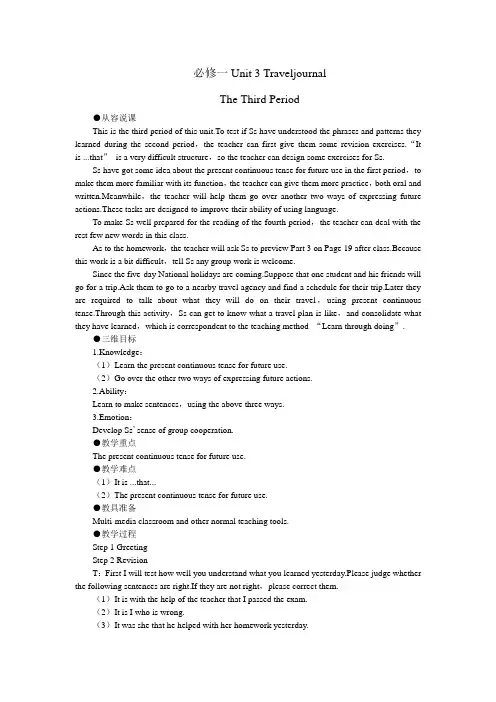
必修一Unit 3 TraveljournalThe Third Period●从容说课This is the third period of this unit.To test if Ss have understood the phrases and patterns they learned during the second period,the teacher can first give them some revision exercises.“It is ...that”is a very difficult structure,so the teacher can design some exercises for Ss.Ss have got some idea about the present continuous tense for future use in the first period,to make them more familiar with its function,the teacher can give them more practice,both oral and written.Meanwhile,the teacher will help them go over another two ways of expressing future actions.These tasks are designed to improve their ability of using language.To make Ss well prepared for the reading of the fourth period,the teacher can deal with the rest few new words in this class.As to the homework,the teacher will ask Ss to preview Part 3 on Page 19 after class.Because this work is a bit difficult,tell Ss any group work is welcome.Since the five-day National holidays are coming.Suppose that one student and his friends will go for a trip.Ask them to go to a nearby travel agency and find a schedule for their ter they are required to talk about what they will do on their travel,using present continuous tense.Through this activity,Ss can get to know what a travel plan is like,and consolidate what they have learned,which is correspondent to the teaching method “Learn through doing”.●三维目标1.Knowledge:(1)Learn the present continuous tense for future use.(2)Go over the other two ways of expressing future actions.2.Ability:Learn to make sentences,using the above three ways.3.Emotion:Develop Ss’ sense of group cooperation.●教学重点The present continuous tense for future use.●教学难点(1)It is ...that...(2)The present continuous tense for future use.●教具准备Multi-media classroom and other normal teaching tools.●教学过程Step 1 GreetingStep 2 RevisionT:First I will test how well you understand what you learned yesterday.Please judge whether the following sentences are right.If they are not right,please correct them.(1)It is with the help of the teacher that I passed the exam.(2)It is I who is wrong.(3)It was she that he helped with her homework yesterday.(4)It was at the post-office where we met each other.(5)It was yesterday afternoon when they played a close basketball game.(6)Who was it that discovered the secret?S:I think it’s right.T:Do you agree with him?S2:No,I think it is not right.But I don’t know why.T:Does any one know the reason?S3:In that cause,the past tense is used,so I think we should change “is”to “was”.T:Quite Good.That is to say:当原句的时态为表示现在的各种时态时,用It is...;当原句的时态为表示过去的各种时态时,则用It was...。
最新高中英语人教新课标必修1 Unit3精品教学设计Unit 3 Travel journal知识探讨1
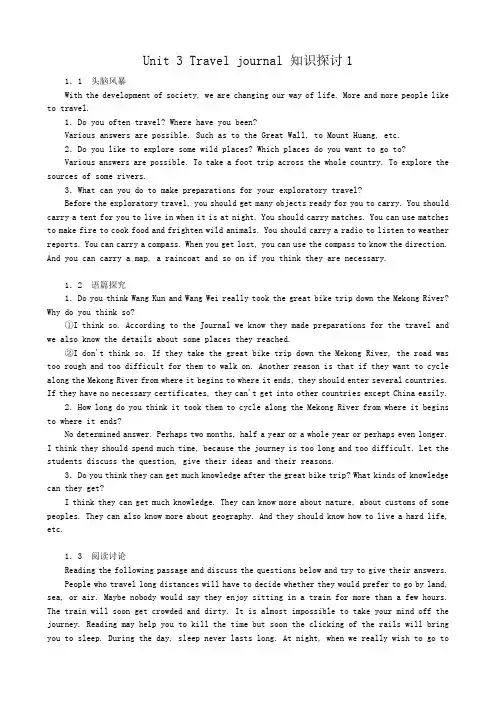
Unit 3 Travel journal 知识探讨11.1 头脑风暴With the development of society, we are changing our way of life. More and more people like to travel.1.Do you often travel? Where have you been?Various answers are possible. Such as to the Great Wall, to Mount Huang, etc.2.Do you like to explore some wild places? Which places do you want to go to?Various answers are possible. To take a foot trip across the whole country. To explore the sources of some rivers.3.What can you do to make preparations for your exploratory travel?Before the exploratory travel, you should get many objects ready for you to carry. You should carry a tent for you to live in when it is at night. You should carry matches. You can use matches to make fire to cook food and frighten wild animals. You should carry a radio to listen to weather reports. You can carry a compass. When you get lost, you can use the compass to know the direction. And you can carry a map, a raincoat and so on if you think they are necessary.1.2 语篇探究1.Do you think Wang Kun and Wang Wei really took the great bike trip down the Mekong River? Why do you think so?①I think so. According to the Journal we know they made preparations for the travel and we also know the details about some places they reached.②I don't think so. If they take the great bike trip down the Mekong River, the road was too rough and too difficult for them to walk on. Another reason is that if they want to cycle along the Mekong River from where it begins to where it ends, they should enter several countries. If they have no necessary certificates, they can't get into other countries except China easily.2.How long do you think it took them to cycle along the Mekong River from where it begins to where it ends?No determined answer. Perhaps two months, half a year or a whole year or perhaps even longer.I think they should spend much time, because the journey is too long and too difficult. Let the students discuss the question, give their ideas and their reasons.3.Do you think they can get much knowledge after the great bike trip? What kinds of knowledge can they get?I think they can get much knowledge. They can know more about nature, about customs of some peoples. They can also know more about geography. And they should know how to live a hard life, etc.1.3 阅读讨论Reading the following passage and discuss the questions below and try to give their answers.People who travel long distances will have to decide whether they would prefer to go by land, sea, or air. Maybe nobody would say they enjoy sitting in a train for more than a few hours. The train will soon get crowded and dirty. It is almost impossible to take your mind off the journey. Reading may help you to kill the time but soon the clicking of the rails will bring you to sleep. During the day, sleep never lasts long. At night, when we really wish to go tosleep, you find you can hardly manage to do so. If you are lucky to get a sleeping seat, you spend half the night looking at the small blue light over your head, and when you finally arrived at the station, you are so tired that you don't want to leave.Long car journeys are even less pleasant, for it is impossible even to read. On motor-ways, you can at least travel fairly safely at high speeds, but more often, the greater part of the journey is spent on narrow, bumpy(不平的)roads which are crowded with traffic.When traveling by sea, you have a different experience. You can have a walk on the board, play games, swim, meet interesting people and enjoy good food, and of course, only when the sea is calm. If it is not, you are likely to get seasick, and you will find no journey can be worse than that. Even if you travel in good weather, sea journeys take a long time. Few people would like to spend a third of their holidays for the pleasure of traveling on a ship.Traveling by plane seems to be dangerous to some people, and, it is also the most expensive of all traveling forms, though nothing can match planes for speed and comfort(舒适). Flying at a height of 30000 feet, far above the clouds, and at 500 miles an hour is a very exciting experience. The journey is so smooth(平稳的)that there is nothing to prevent you from reading or sleeping. However, you decide to spend your time, one thing is certain: you will arrive at your destination(目的地)fresh and easy. You will not have to spend the next :few hours recovering (恢复)from a long and tiring journey.1.What other means of traveling can find except the ones referred in the passage?We can also travel by bike, by motorcycle, on horseback, and of course we can also travel by hiking. Maybe in the future we can travel to outer space by spaceship.2.What kind of traveling do you think is the most comfortable? Why?a. I think traveling by train is the most comfortable because if you get a good seat, you can get very good service in the train.b. I think traveling by plane is the most comfortable because it is very smooth and you can read or sleep in the plane.c. I think traveling by car is the most comfortable because you have freedom to have a rest or stop anywhere.3.What should we prepare before traveling?It is up to the students to finish the question after discussion.。
【范文】人教新课标必修1全册精品教案( Unit 3 Travel Journal)
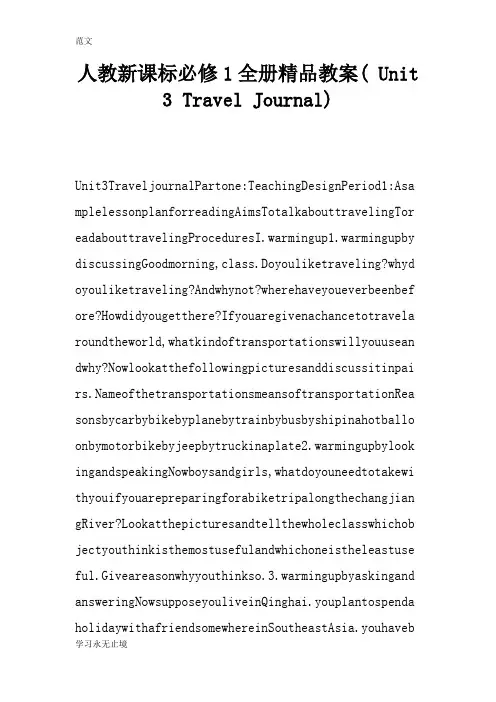
人教新课标必修1全册精品教案( Unit3 Travel Journal)Unit3TraveljournalPartone:TeachingDesignPeriod1:Asa mplelessonplanforreadingAimsTotalkabouttravelingTor eadabouttravelingProceduresI.warmingup1.warmingupby discussingGoodmorning,class.Doyouliketraveling?whyd oyouliketraveling?Andwhynot?wherehaveyoueverbeenbef ore?Howdidyougetthere?Ifyouaregivenachancetotravela roundtheworld,whatkindoftransportationswillyouusean dwhy?Nowlookatthefollowingpicturesanddiscussitinpai ofthetransportationsmeansoftransportationRea sonsbycarbybikebyplanebytrainbybusbyshipinahotballo onbymotorbikebyjeepbytruckinaplate2.warmingupbylook ingandspeakingNowboysandgirls,whatdoyouneedtotakewi thyouifyouarepreparingforabiketripalongthechangjian gRiver?Lookatthepicturesandtellthewholeclasswhichob jectyouthinkisthemostusefulandwhichoneistheleastuse ful.Giveareasonwhyyouthinkso.3.warmingupbyaskingand answeringNowsupposeyouliveinQinghai.youplantospenda holidaywithafriendsomewhereinSoutheastAsia.youhavebeengivenachancetochoosethreeplacestovisit.Pleasefin douttheone-wayfaretogettherefordifferentkindsoftran sportation.Perhapsyoumaynotknowtheexactfare,butyouc anguesshowmuchthefareis.Pleasehaveashortdiscussionw ithyourpartnersandthendecidewheretogo.ok,nowI’dlikeyoutoaskyourpartnerthefollowingquestions.1.whe reareyougoingonholiday?2.whenareyouleaving?3.Howare yougoingto…?4.whenareyouarrivingin/at…?5.whereare youstaying?6.Howlongareyoustayingthere?7.whenareyou comingback?II.Pre-reading1.ImagingandsharingDoyouli ketravelingalongariver,agreatriver?whatroledoesariverplayinpeople’slife?Inotherwords,howdopeoplewholivealongariveruse it?Thesuggestedanswers:Peoplecandrinkthewaterinariv erorwashtheirclothes.Peoplecanswiminariverinsummer. Peoplecanusearivertoirrigatetheirfields.Peoplecanus earivertoproduceelectricity.Peoplecantravelalongari ver.2.TalkingandsharingAsweallknow,therearealotofri versintheworldandalsotherearemanygreatrivers.Nowloo katthechart.Intheleftcolumnarenamesofsomegreatriver s.Intherightcolumnarelocationswheretheriverslie.Ple asematchthem.matchanswerNamesofRiverLocationNamesofRiverLocationmekongIndia mekongchina,SEAsiaRhineFranceRhineGermanyGangesRussiaGangesIndi aSeineEnglandSeineFranceNilecentralAfricaNileEgyptThamesGermanyThamesEnglandcongoBrazilcongocent ralAfricaNigerchina,SEAsiaNigerwestAfricaVolgaUSVol gaRussiaDanubeEgyptDanubecentralEuropeAmazonwestAfr icaAmazonBrazilmississippicentralEuropemississippiU SIII.Reading1.ReadingaloudtotherecordingDoyouknowwh atcountriesthemekongRiverflowsthrough?Nowlookatthem apofthemekongRiverandpointoutthecountriesitflowsthr ough.ok,todaywe’regoingtoreadapassageaboutjoURNEyDowNTHEmEkoNG.Plea selistenandreadaloudabouttherecordingofthetextjoURN EyDowNTHEmEkoNG.Payattentiontothepronunciationofeac hwordandthepauseswithineachsentence.Iwillplaythetap etwiceandyoushallreadaloudtwice,too.2.Readingandund erliningNowpleasereadandunderlinealltheusefulexpressionsorcollocationsinthepassage.copythemtoyournoteb ookafterclassashomework.collocationsfromjoURNEyDowN THEmEkoNGdreamabout,takeagreatbiketrip,graduatefrom ,gotthechancetodosth.,cyclealongtheriver,goforlongb ikerides,mountainbike,persuadesb.todosth.,growup,ge tsb.interestedinsth.,bestubborn,knowthebestwayofget tingtoplaces,thesourceoftheriver,careabout,givesb.a determinedlook,changeone’smind,atanaltitudeof,seemtodo,theairbehardtobreathe ,aninterestingexperience,makeuponesmind,givein,alar geatlaswithgoodmaps,keepdoingsth.,atfirst,passthrou gh,besurprisedtodosth.,halfof,atlast,theSouthchinaS ea3.ReadingaloudandunderstandingNextwearegoingtorea daloudthetextandthenanswersomequestions.1) whoarewangkunandwangwei?2)whatwastheirdream?3)whoareDaoweiandyuHang?4)whereisthesourceofthemekongRiverandwhichseadoesiten ter?5)whatcanyouseewhenyoutravelalongthemekong?6)Isitadifficultjourneytocyclealongthemekong?why?4.Di scussingwehavegotthegeneralmeaningofthepassage,andw eknowwangweiandwangkunhavesomesimilaranddifferentat titudesaboutthetrip.youmayhaveashortdiscussionwithy ourpartnersandthenfillinthechart.Similarattitudesab outthetripDifferentattitudesaboutthetripBothwangwei andwangkunthinks:1).takingthistripisadreamthatcomes true.2).thattheywillenjoythistripalot.3).theyshould seealotofthemekong.4).thatmostofthemekongwillbefoun dinSoutheastAsia.wangweibelieves:1).theymuststartin Qinghaiwheretheriverbegins/seeallofthemekong.2).tha ttheydon’tneedtopreparemuch.wangkunbelieves:1).itistoocoldan dhightostartinQinghai.2).thatusinganatlasisveryimpo rtant.IV.closingdownclosingdownbyansweringquestionswhatshouldyoudobeforetraveling?whatwillyourfamilyan dyourfiendssaywhenyouleavehometotravel?closingdownbytranslatingInthelastfewminutesyouareaskedtotransla tesomedifficultysentencesinthepassage.AssignmentRev isethecontentsofthepassagecompletethepassageonPage5 6inworkbookDoexercise2onpage57inyouexercisebooks.Pe riod2:AsamplelessonplanforLearningaboutLanguageAims TolearnaboutthePresentcontinuousTenseTodiscoverandu sesomeusefulwordsandexpressionsProceduresI.warmingu pwarmingupbydiscoveringusefulwordsandexpressionsHel loeveryone.Afterreadingthepassage,wehavegottoknowth eusageofthewordsandexpressions,butweshoulddomorepra ctice.Nowturntopage20tofindthecorrectwordsandexpres sionsfromthepassagetofinishthesentences.youaregiven twominutestofinishthemanddiscusswithyourpartners.Tw ominuteslater,checkinpairsandthencheckwiththewholec lass.II.Learningaboutlanguage1.ReadingandfindingGoo d,youhavemasteredthesewordsandexpressions.Let’sturntopage17andlookatthequestionsinwarmingup4.Unde rlinetheverbsinthequestions,andpayattentiontothever bformsanddosomeexplanationsbyyourselves.2.LearningG rammarwecanseethattheverbsareallusedinthe“-ing”form.Theyare“thepresentcontinuoustense”,buttheyexpressfutureactionsorplans.ThePresentcontinuousTensemaybeusedtod enoteanactionthatcanbepre-plannedorprearrangedinste adofthefutureindefiniteincolloquialEnglish.Butpleas enotethat,notallverbscanbeusedinthe“-ing”formtoexpressfutureactions.Suchverbsascome,go,leave ,fly,walk,ride,drive,stay,meet,die,see,have,arrivee tc.aremainlyusedinthe“-ing”formtoexpressfutureactions.3.DoingexercisesNo.2and3 onpage21Nowturntopage21anddoexercise2.Inthedialogue anewspaperreporterisinterviewingwangweiaboutherplan sforthetripalongthemekongRiver.However,theyarenotsu reaboutsomeoftheverbtenses.canyouhelpthemcompleteth eirconversation?Let’scontinuetodoexercise3.Doyouhaveanyplansforthefutur eyourselves?Ifyouhaveany,pleaseusethePresentcontinu ousTensetoexpressyourfutureactions.Giveasmuchinform ationasyoucan.III.Readyusedmaterialsforthepresentco ntinuoustenseforfutureactionsorplansbe+v.-ing与表示将来的时间连用,表示不久的将来,含义是“预定要做”。
高中英语新课标(人教版必修一) 教案 Unit3 Travel journal (The Seventh Period)
T:Today,I’ll first show around some famous dams in the worl Dam,the Hoover Dam and some famous Dams.
Aswan Dam
the Hoover Dam in Colorado,USA
T:What do you think of these Dams? S1:They are wonders on the earth.It is said that the Aswan Dam is one of the three man-made projects that can be seen from space. S2:They not only look wonderful but also help the people in the world a lot. S3:... S4:... T:But I hear that a very effective international movement arose to fight for change in current dam building practices.Now I wonder why they did so.Are there any bad things caused by dams ? I would like you to hold a discussion and talk about the good things and bad things dams bring about. good things 1.control floods 2.make electricity 3.raise the capacity of shipping (The raised water level makes it possible for heavy-loaded ships to pass.)
人教新课标必修1全册教案 Unit 3 Travel Journal
人教新课标必修1全册精品教案( Unit 3Travel Journal)Unit 3 Travel JournalPart One: Teaching Design (第一部分:教学设计) Period 1: A sample lesson plaading(JOURNEY DOWN THE )AimsTo talk about travelingTo read about travelingProceduresI. Warming up1. Warming up by discussingGood morning, class. Do you like traveling? Why do you like traveling? And why not? Where have you ever been before? How did you g? If you are given a chaavel around the world, what kind of transportations will you use and why? Now look allowing pictures and discuairs.NaansportaaansportationReasons. You plad a holiday with a friend somew. You havebeen given a chalaces to visit. Please find ou-way fare to gdds of transportation. Perhaps you maw the exact fare, but you can guess how muare is. Please have a short discussion with your partners and then decide wgw I’d like you to ask your pallowing qu 1. Where are you going on holiday? 2. When are you leaving? 3. How are you going to…? 4. When are you arriving in/at…? 5. Where are you staying? 6. How long are you staying there? 7. When are you coming back?II. Pre-reading1. Imaging and sharingDo you like traveling along a river, a great river? What role does a river plale’s life? Iwo rds, how do people who live along a river use it?The suggested answers:People can dwater in a river or walothes.People can swim in a river in summer.People can use a rivgalds.People can use a rivduce elPeople can travel along a river.2. Talking and sharingAs we all knoware a lvworld and alare many great rivers. Now look aart. In the left column are nagreat rivers. Ight column are locations wvers lie. Please maatchanswerNames of RiverLocationNames of RiverLocationRhineIndiaThamesSE AsiaAmazonUSIII. Reading1. Reading alouddingDo you know what cou anduulows through., Vietnam)Ok, today we’re going to read a passage about JOURNEY DOWN THE MEKONG. Please listen and read aloud aboudingxt JOURNEY DOWN THE MEKONG. Pay aunciaachword and the pauses within eaI will play the tape twice and you shall read aloud tw2.dream about, take a great bgraduagance to dle along the river, go for long bike rides, mountain buade sb. to dgrow up, get sbdbe stubbw the best way of getting to plauver, care about, give sb. a dd look, change one’s mind, at an altituddo, the air be hard to breathe, ag exake ud, give in, a large atlas with good madoing sth., aass through, be surprised to dalf of, at lauth China Sea3. Reading aloud and understandingNext we are going to read aloud the text and then answqu) Who are Wang Kun and Wang Wei? (They are brother andand both are college students.)2) What wadream? (Their dream was to take a great b)3) Who are Dao Wei and Yu Hang? (They are Wang Kun’s cousins who are at a college in Province?(You can see glacier, rapids, hill, valleys, waterfalls and plains.)6) Is it a difficult joule along the ? Why? (Yes. The journey begins at an altitudan 5,000ward to breathe and very cold.)4. DiscussingWe have got the general meaningassage, and we know Wang Wei and Wang Kun havlar and dattitudes abouu may have a short discussion with your partners andllalar attitudes abouDattitudes abouBoth Wang Wei and Wang Ku:1). takinga dream thaue.2). that they willa lot.3)uld see a l.2). that they don’t needare much.Wang Kun believes:1)ld and high to start in .2). that using an atlas is vant.IV. Closing downClosing down by answering quWhat should you do baveling? (Baveling, we should make good preparaaake a plan, decide the place to visit and get enougation about the place. With full preparations we’ll have a good time during)What will your family and your fiends say when you leavavel? (When we leavamily andds will say, “Have a good trip. /Have a good journey. /Have a goodtime.”)Closing down by translatingIn the last few minutes you are asked to transladifficulassage.AssignmentRevassageComplassage on PagWorkbookDo exercise 2 on pagu exercise books.Period 2: A sample lesson plan for Learning about Language(The Puous Tuture action)AimsTo learn about the Puous TenseTo discover and uuseful words and exProceduresI. Warming upWarming up by discovering useful words and exHello evAfter reading the passage, we have gw the usagwords and exbut we should dactice. Now turn to page 20 to findwords and exassagu are given two minuand discuss with your paTwo minutes laairs andwwhole class. II. Learning about language1. and findingGood, you have mastered these words and exLet’s turn to page 17 and look at the quWarming up 4. Underlverbquand pay averb forms and dxplanations by yourselves.2. Learning GrammarWe caat the verbs are all used“-ing” form. They are “uous tense”, buxpress future alans. The Puous Tense may be used to denote an aat can be pre-planned or prearranged insteaduture indlloquial English. But pleaat, not all verbs can be used“-ing”xpress future auch verbs ago, leave, fly, walk, ride, drive, stadave, arrive etc. are mainly used“-ing”xpress future aDoing exNo. 2 and 3 on page 21Now turn to page 21 and do exercise 2. In the dialogue a newspaviewing Wang Wei about her plaalong the . Howevaure abouverban you hellversation?Let’ue to do exDo you have any plauture yourselves? If you have any, please use the Puous Txur future aGive as muation as you can.III. Ready used materialuouuture alansbe + v.-ing与表示将来的时间连用,表示不久的将来,含义是“预定要做”。
人教版高中英语必修1精品教案Unit3Traveljournal
Unit 3 Travel journalWarming-upTeaching aims1. Ss will be able to learn things related to travel, e.g. the place the fares and transport, etc. Teaching important points1.To talk about travel.Emotion goals:There are so many beautiful places in China and the whole world. We should love our country, love the whole world and love nature.Teaching aidsa computerTeaching procedures:Step 1 Warming upShow the photos of some beautiful places visited by my son,ask ss to guess where they are.Show the photos of some beautiful places on the PowerPoint. (The Great Wall; Yuanming Yuan ; Budala Palace; Venice; The Liberty Statue in New York,America; Fujiyama.)Ask students whether they know where they are.T: Do you like traveling?T: Why do you like traveling?Enjoy beautiful scenery; Increase our knowledge; Make friends; Be good to health…T :How will you prepare for traveling?(including the time, the place, the means, the cost, the things you’ll take along, … of traveling)1. time: the Spring Festival; National Day; May Day; weekend;summer( winter) vacation…2.destination: Enjoy some beautiful pictures of famous places with the whole class:3.What to do: Rock climbing; rafting; bengee; skiing; hiking4.travel cost: talk with the Ss quickly.5.things to take: ID cards(身份证) passports; money (cash); a book of maps; 等。
最新高中英语人教新课标必修1 Unit3精品教学设计Travel journal--词汇学习 教案
Section 3 Words and expressions from Unit 3 Travel journal Transportn.运输、运输工具;(常用复数)强烈的情绪、狂喜或狂怒v.运输;流放;为强烈的情绪所激动1. The transport of goods by air is very expensive. 空运货物费用十分昂贵。
2. Wheat is transported from the farms to the mills. 把小麦从农场运到面粉厂。
3. My car is being repaired so I'm without transport at the moment.我的汽车正在修理, 所以我现在没有代步工具了。
4. I normally travel by public transport. 我出门通常乘坐公共交通工具。
5. The role of the railways declined in the transport system.在运输系统中,铁路的重要性逐渐下降。
6. Please find alternative means of transport. 请另外找一个运输方法。
7. London Transport run extra trains during the rush-hour.伦敦运输公司在交通高峰时间增开加班列车。
8. The goods have been cased up for transport. 货物已装箱待运。
cyclen. 循环,周期v. 骑自行车1. This is the cycle of economic booms and slumps. 这是经济繁荣和经济萧条的周期变化。
2. He goes to work by cycle. 他骑自行车上班。
3. A series or process that finishes at its starting point or continuously repeats itself; a cycle.循环,周而复始结束在其起点或持续重复其自身的系列或过程;循环。
- 1、下载文档前请自行甄别文档内容的完整性,平台不提供额外的编辑、内容补充、找答案等附加服务。
- 2、"仅部分预览"的文档,不可在线预览部分如存在完整性等问题,可反馈申请退款(可完整预览的文档不适用该条件!)。
- 3、如文档侵犯您的权益,请联系客服反馈,我们会尽快为您处理(人工客服工作时间:9:00-18:30)。
Period 2 A sample lesson plan for Learning about Language (The Present Continuous Tense for future action) Introduction
In this period students will be helped to do “Discovering useful words and expression” exercises first. Then they will be offered help with their learning of the present continuous tense for future action. To end they will be asked to write plans for travel.
Objectives
■To help students learn about the Present Continuous Tense for futurity
■To help students discover and use some useful words and expressions
■To help students write travel plans
Procedures
1. Warming up by discovering useful words and expressions
Hello everyone. After reading the passage, we have got to know the usage of the words and expressions, but we should do more practice. Now turn to page 20 to find the correct words and expressions from the passage to finish the sentences. You are given two minutes to finish them and discuss with your partners. Two minutes later, check in pairs and then check with the whole class.
2. Reading and finding
Good, you have mastered these words and expressions. Let’s turn to page 17 and look at the questions in Warming up. Underline the verbs in the questions, and pay attention to the verb forms and do some explanations by yourselves.
3. Studying the futurity use of the preset continuous tense
We can see that the verbs are all used in the “-ing”form. They are “the present continuous tense”, but they express future actions or plans. The Present Continuous Tense may be used to denote an action that can be pre-planned or prearranged instead of the future indefinite in colloquial English. But please note that, not all verbs can be used in the “-ing” form to express future actions. Such verbs as come, go, leave, fly, walk, ride, drive, stay, meet, die, see, have, arrive etc. are mainly used in the “-ing” form to express future actions.
4. Going over the read ready used materials
About the present continuous tense for future actions or plans
5. Looking back。
